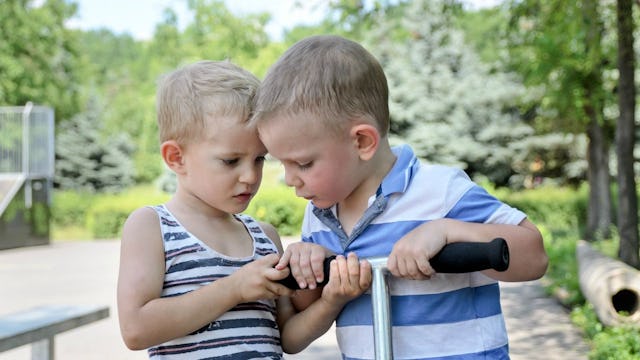No, I Don't Make My Child Share — And This Is Why

My daughter loves tiny toys, like Shopkins, NumNums, and LOL surprise dolls. She takes a purse full of these tiny treasures wherever we go. As you can imagine, these draw a lot of attention from other little kids. Most of the time, my daughter chooses to share her toys, but if she doesn’t want to, I don’t make her.
I’ve caught an occasional sideways look from a surprised parent when they hear me tell my daughter she doesn’t have to share if she doesn’t want to. I know this may be going against the social grain, but this is just how we roll.
That’s right, I don’t make my kids share. What’s mine is yours is not a concept I subscribe to as a parent. It’s strange, actually, because I never thought I would parent this way. I was always expected to share as a child, and though it wasn’t my favorite thing to do, it taught me how to share with others. Or so I thought.
I had planned to raise my kids the same way, they would be expected to share, and eat a serving of vegetables with every meal, go to bed without a fight, and do all the other stuff that kids are supposed to do. I mean, kids do what you tell them, right?
Ha. I had a few kids, and it turns out parenting is a little (read: a lot) different than I expected, so I’ve made some modifications to my original plan, including my thoughts on sharing.
As adults, we don’t share unless we want to—it’s a choice. I mean, if you like my car that doesn’t mean I have to let you drive it. If you didn’t bring your lunch to work, I’m not required to share mine with you. (I mean, if you asked nicely, I might, but it wouldn’t be the expectation.) So, why should kids be expected to share their snacks or their toys simply because someone asked for them? Aren’t we also trying to teach appropriate boundaries and respect of others? If a child tells another child “no,” they should respect that, right? They aren’t entitled to another child’s toy because it’s visible and looks interesting.
Boundaries are healthy, and giving kids the opportunity to make a personal choice, like sharing for example, helps develop their autonomy and sense of self. We, as parents, are meant to guide our children. We are teachers, not dictators. There is value and opportunity to teach when we provide our children options as opposed to firm instruction. Allowing children to make their own choices often opens the door for conversation.
Asking, “Why didn’t you want to share your truck with Billy?” allows your child to explain their thoughts and feelings. Maybe they didn’t want to share because Billy is rough with toys, maybe Billy is mean to them, maybe they just really love that blue truck, and Billy can get his own damn truck. Either way, they have feelings that should be validated.
To be clear, I’m not talking about environments where sharing is the expectation, like school for example. My kids are expected to share community items and not act like heathens. The idea of optional sharing is more for personal items, food, special toys, and the like.
And while it may seem odd to some, the idea of sharing as a choice isn’t new. In fact, I’ve met plenty of parents just like me. They don’t let their park time and playdates become consumed by sharing battles. When another parent insists their child shares with my child, I politely decline, and explain my reasoning. I think sometimes parents assume this is the expectation if their child brings a snack or a toy around other children, but it shouldn’t be.
Of course, it goes both ways. Sometimes my kids get upset when another child won’t share their cool toy, but that’s pretty normal, and it gives us the opportunity to talk about permission. My kids are learning that they aren’t entitled to something just because the want it. That’s not how the world works, and when someone says “no,” we respect that. We don’t have to like it, but we do have to move on.
What I’ve found most interesting about our experience is that while I don’t force my kids to share, they are often eager to share with their friends and peers. They actually love to make their friends happy by sharing their toys. Sharing is another form of kindness, so I will always encourage it, but only if my kids are comfortable doing so. If they aren’t, I’m totally cool with it.
They know it’s their choice, and there are no consequences if they decide they want to keep their special items to themselves. I support them and their choices, even if they won’t share their cookies with me.
This article was originally published on